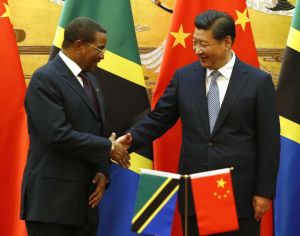China’s Role in the Fight Against Ebola
 On October 24, China announced that it would donate $82 million to Liberia, Sierra Leone and Guinea to contribute to the fight against Ebola. This will be China’s fourth round of aid and its largest donation so far, to the fight against the virus. Additionally, over the past months, China has supplied aid workers and doctors to the affected regions. Although China’s unprecedented generosity may be founded in economic and political interests, its efforts should not be downplayed.
On October 24, China announced that it would donate $82 million to Liberia, Sierra Leone and Guinea to contribute to the fight against Ebola. This will be China’s fourth round of aid and its largest donation so far, to the fight against the virus. Additionally, over the past months, China has supplied aid workers and doctors to the affected regions. Although China’s unprecedented generosity may be founded in economic and political interests, its efforts should not be downplayed.
Since mid-August, China has stepped up its contribution to fight Ebola by sending aid and medical teams to the most affected region in West Africa. While the European powers and the US and Japanese governments began evacuating their own health personnel at the beginning of the outbreak, China sent three teams of infectious disease experts and five million dollars of medical supply. Since then, China has kept its upscale commitment to the Ebola issue and currently has 115 medical staff on the ground. Last week, it sent a laboratory team of 59 to Sierra Leone. Between medical and monetary aid, China has provided a total of $120 million to the affected countries. The WHO has applauded Chinese efforts and described their commitment as a “huge boost morally and operationally”.
China’s contributions, however, have not been without controversy. Some scholars have questioned the degree to which China can contribute to a disease such as this one. China has failed to analyze, control and correctly monitor widespread diseases within its own borders - the avian influenza virus stands as a perfect example of this. China still has not finished constructing facilities dedicated to the research and study of these diseases, and according to Chinese scientists, China does not have the capacity to do basic research on the Ebola virus either.
In addition, it is well known that China has great economic and political interests in its involvement in fighting Ebola. China has large investments in the West African region that it wants to keep protected, and is also concerned for the lives of the 10,000 chinese nationals that live in this part of Africa. It is in their best economic interest to resolve this disease so that the region becomes stable and more economic ties can be developed in the future. Moreover, China is seizing the opportunity to play a role in finding a cure for Ebola because it will improve its image in the eyes of the international community, particularly African nations. In short, China’s role in fighting Ebola can be seen as another strategy of soft power geared towards increasing its presence and influence in the region and realizing larger profits and international political capital.
The Chinese role in assisting African countries to fight Ebola should not be undermined. On one hand, China’s goals might not be the most transparent in the views of many international commentators; on the other, its capability to offer technical analysis and control capacities for the disease might not be the best either. Nevertheless, it cannot be disputed that the aid Beijing has contributed to the fight against Ebola has had a positive impact and has been recognized by national governments and the WHO.
